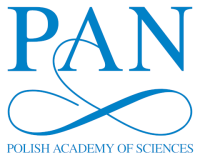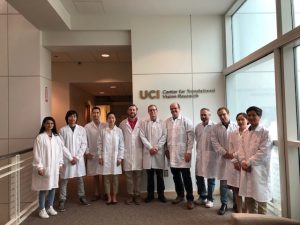We create a global eye health ecosystem
Professors, scientists, senior researchers, PhD students, Post-docs, and technicians working in laboratories in Poland, the United Kingdom, and the US collaborate to achieve our common goal: improve the ocular health of humanity. Our ecosystem is expanding, positively impacting the quantity and quality of scientific knowledge about eye functioning and structure, leading to the prevention and treatment of sight diseases, and the development of new eye therapies and precision ocular medicine.

Mode-Locked Technology

Mode-Locked Technology is a spin-off company from Wroclaw University of Science and Technology (Wroclaw, Poland) founded in 2020 by Dr. Jarosław Sotor and Dr. Grzegorz Soboń. Their mission is to commercialize novel, cutting-edge laser-based technologies. Product capabilities include femtosecond oscillators (Erbium, Thulium), broadband and tunable sources (1000 – 2200 nm), mid-infrared sources (3 µm, 8 µm), high-power femtosecond lasers, fiber amplifiers and customized laser systems.
Mode-locked Technology supplies bespoke pulsed lasers for our two-photon human experiments.

FLUENCE

Founded in 2016, Fluence Sp. z o.o. is a leading manufacturer of femtosecond fiber laser solutions. The company offers robust and stable industrial-grade femtosecond lasers that are immune to misalignment and feature a novel all-fiber oscillator for a robust, reliable package. Fluence is devoted to providing the highest quality standards and product reliability, offering a product lifetime that extends well over the warranty period.
Fluence collaborates with ICTER supplying pulsed lasers for our two-photon research.

POLGENIX

Established in 2006, Polgenix, Inc., is a small biotech company, whose aims encompass two areas: 1. Drug discovery targeting G protein-coupled receptors (GPCRs) to treat common blinding diseases, 2. Innovative high-resolution retinal imaging for ophthalmic drug discovery.
Polgenix is cooperating with ICTER on the front of evaluating novel eye diagnostic methods.

Praevium Research

Praevium Research was founded in 2001, with the mission of commercializing high functionality, radically miniaturized opto-electronic devices for a variety of system applications. The company’s core competencies are in the design and fabrication of semiconductor lasers, detectors, and photonic integrated circuits, and their application in medicine, agriculture, and communications. The Praevium team works with collaborators to develop new photonic devices customized to specific applications. Previous collaborations with university research groups have resulted in novel devices for spectroscopy, OCT and machine vision.
Praevium Research works with ICTER on testing and characterization of OCT light sources.

OPTOPOL Technology

Optopol Technology sp. z o.o. is a leading brand in the Polish ophthalmology devices market. Developed the world’s first Spectral Domain OCT device, SOCT Copernicus from the prototype provided by the scientists prof. Maciej Wojtkowski and prof. Andrzej Kowalczyk of the Nicolaus Copernicus University in Torun. Optopol consistently provides new devices and solutions for the market. Another world’s first, this time exceeding 130.000 A-scans per second in a standard device, is their REVO NX 130.
Optopol collaborates with ICTER in evaluation and cross-checking of ICTER’s human measurements data.

OCULOMEDICA

An ophthalmology clinic, performing intraocular surgeries, all kinds of laser treatment, anti-VEGF and glaucoma therapy, innovative clinical trials and other medical procedures. Provides full-featured on-board diagnostics.
Oculomedica cooperates with ICTER in organizing human volunteer testing sessions and ICTER’s novel eye imaging device evaluation.



Polish Academy of Sciences
Polish Academy of Sciences – a state scientific institution that carries out activities for the development, promotion, integration and dissemination of science.


Polish Ministry of Education and Science
Ministry of Education and Science (MEiN) – a Polish government administration office serving the minister responsible for government administration departments of education and upbringing and higher education and science.


Foundation for Polish Science
The Foundation for Polish Science has been in operation since 1991. It is a non-governmental, non-political, non-profit institution that pursues the mission of supporting science. It is the largest source of science funding in Poland outside of the state budget.


National Science Center, Poland
National Science Center is a government agency, supervised by the Ministry of Science and Higher Education, set up in 2011 to support basic research in Poland.




